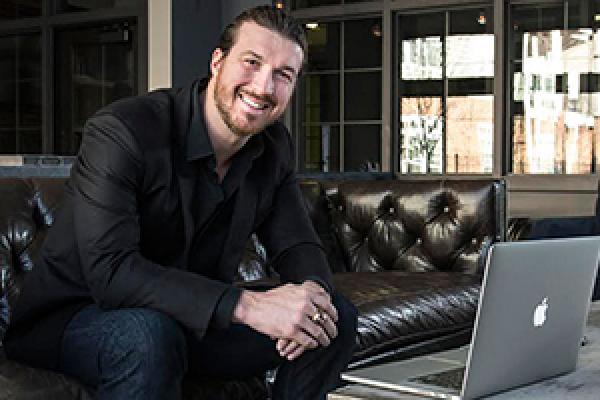Sports psychologist explores what happens when sports end

What happens when the stadium lights flicker out? When the stands empty? When the final whistle blows?
What happens after a student-athlete plays their last game and hangs up their jersey for good?
For Ohio State sports psychologist and former Buckeye football player Steve Graef (BA, psychology, 2004), it was a seamless transition from athletics to post-college life. Graef was a preferred walk-on coming out of Lake High School in Canton and saw little playing time for the Buckeyes, so it fairly easy for him to move on from the game.
For some student-athletes, however, it isn’t so simple.
The College of Arts and Sciences Sports and Society Initiative will explore and discuss this dynamic during its event, “When Sports End,” on April 11 at the Ohio Union. Graef will moderate a panel of speakers consisting of several former Buckeyes, including men’s basketball player Greg Oden, football player Joshua Perry and synchronized swimmer Monica Velazquez-Stiak. Other featured speakers throughout the event include associate professor of sociology Chris Knoester, Ohio State lead sports psychologist Jennifer Carter and former Buckeye football player Malik Barrow.
“It’s not all puppy dogs and rainbows retiring from sports,” Graef said. “It can be difficult, but it can also be one of the best things ever because you have an opportunity to open the door and begin writing a new chapter. It’s really about that kind of balanced, fair assessment of both the struggles and the strivings associated with retirement.”
Graef’s experience as a student-athlete helps him understand and appreciate the culture of athletics and the unique demands student-athletes can face. He also credits his time in the classroom for helping shape his career.
“My psychology degree at Ohio State was paramount, as too were other opportunities like psychology club, a psychology peer-mentoring program, research opportunities with faculty and receiving instruction from top-notch and well-respected educators,” he said. “Ohio State certainly served as a strong foundation for me to start my psychology training and career.”
Both Oden and Perry recently retired from professional sports after injuries derailed promising careers. Oden guided Ohio State to the 2007 national championship game and was drafted No. 1 overall by the Portland Trail Blazers. Injuries sustained to his knees, however, forced him off the court, and he retired from the NBA in 2014. Perry played linebacker for Ohio State for four seasons from 2012 to 2015. He helped the Buckeyes win a national title in 2015 and was a fourth-round draft pick by the San Diego Chargers. He retired in July of 2018 after suffering his sixth concussion.
After their playing days ended, Oden and Perry turned their focus to other career paths. Oden returned to Ohio State and will graduate this spring with a bachelor of science in education, sport industry. Perry, who earned his degree in consumer and family financial services, is founder and CEO of the nonprofit Joshua Perry Family Foundation.
Both are examples of athletes who, after their careers ended prematurely, were able to move forward.
“It doesn’t have to be a terrible process,” Graef said. “Though, for a lot of folks, it can also be a bit bittersweet. Though they are excited to move on from the sport, there’s also a bit of hesitancy and sadness with leaving that familiarity and your teammates.”
Examining how athletes cope with the end of their athletic careers is just a part of the larger field of sports psychology. Student-athletes navigate athletic commitments, responsibilities and pressures while at the same time adjusting to college life. Graef, who earned his PhD in counseling psychology from the University of Akron, helps them juggle those aspects.
And he hopes “When Sports End” will help shed light on what student-athletes can struggle with.
“It’s about increasing awareness and getting a slightly different side of what athletes, and even high-performers in general, experience,” he said. “There’s a little bit more underneath the strength and the nimbleness — there’s a real person who’s trying to navigate and figure out this life just like all of us.”
“When Sports End” is free and open to the public. Registration is now open, though space is limited.
